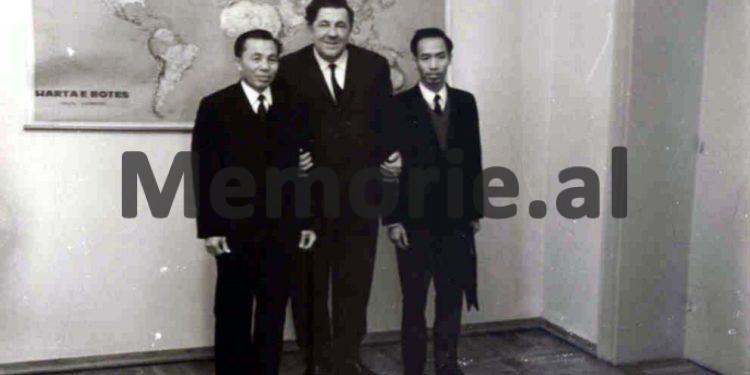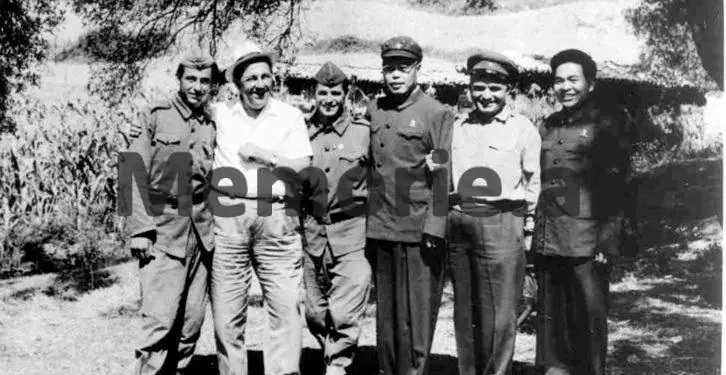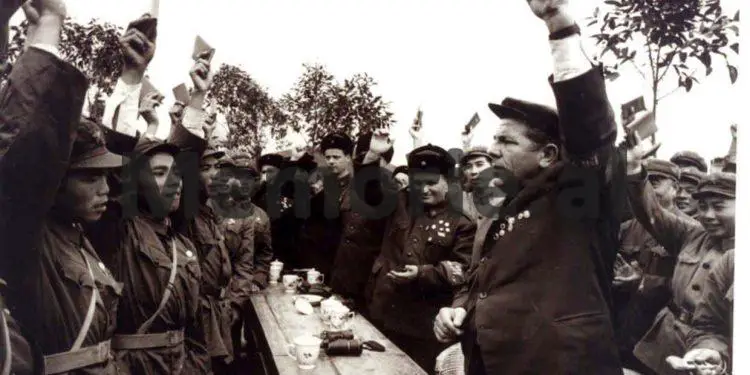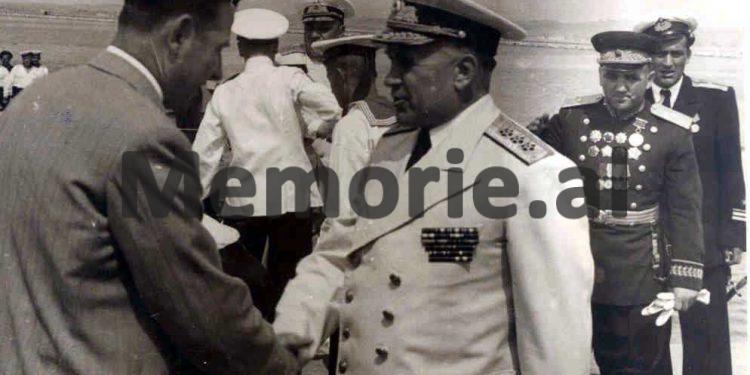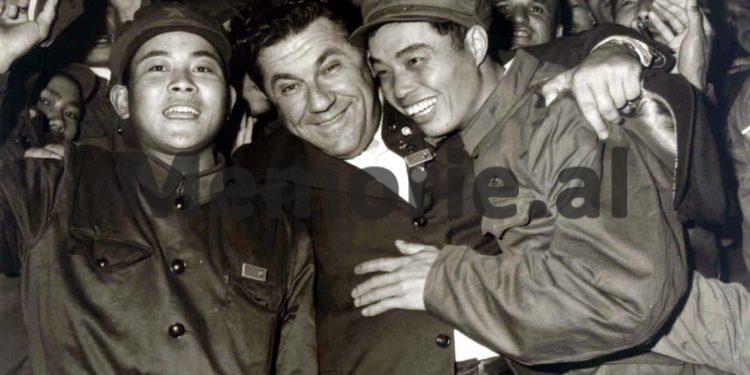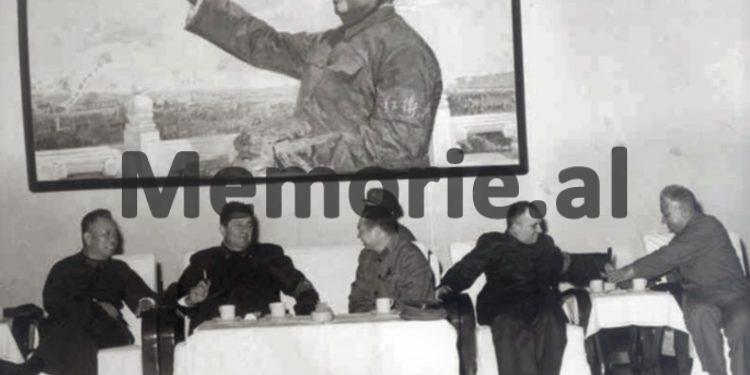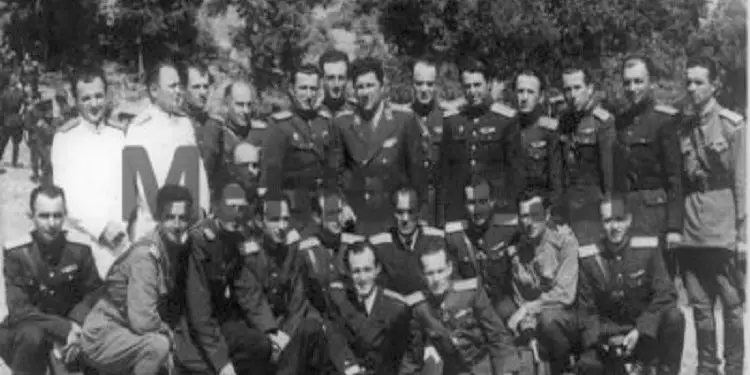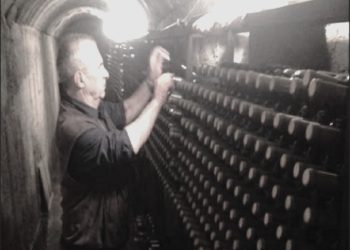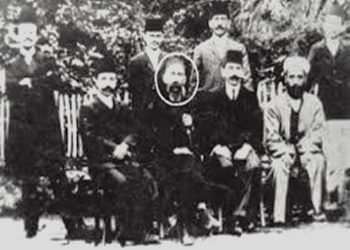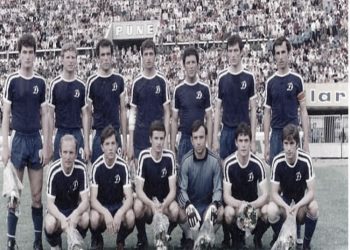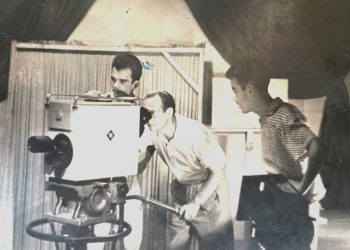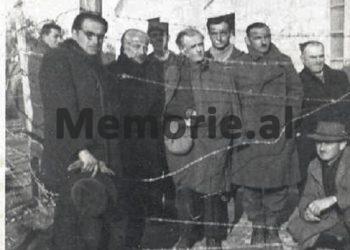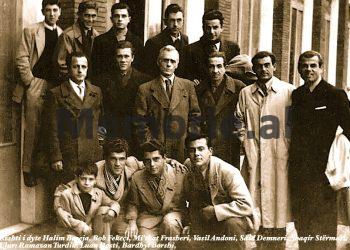Dashnor Kaloçi
Memorie.al publishes the unknown story of Colonel Elami Hado, who after graduating with a ‘Gold Medal’ at the Academy “Frunze” of the Soviet Union and had held several senior positions in the Ministry of National Defense in Tirana, in 1961 was sent with the duty of military attaché in China, where in ’63, he attended a meeting of the Warsaw Pact that took place in Hanoi, because of the war that the Americans had started with Vietnam. The rare testimony of Colonel Hados, considered one of the best theorists of the Albanian Army, regarding the conversations he held during those days that he represented Albania in that meeting of the highest military of the communist countries, where the Deputy Minister of Defense of Bulgaria, Major General Markov, told him: “Your leadership is sold to imperialism and your Prime Minister, Mehmet Shehu is an agent of the Americans”! How did Colonel Hado respond to that serious accusation and the report he made in Tirana by secret mail about the whole conversation with the Bulgarian general, which would cause him, years later, to be criticized, accused and beaten by Prime Minister Mehmet Shehu, as a “defeatist and cowardly theorist” and end up for 16 years in prison and internment…?!
After the already known accusations that Enver Hoxha made against the former Albanian Prime Minister Mehmet Shehu in his ‘Synoptic Table’ in the beginning of 1982, where among other things it was said that: during the trip with the steamer ‘Cuin Elisabet’ on the occasion of his visit in New York in 1960, Mehmet Shehu had secretly met with Tito, another accusation against former Prime Minister Shehu, as an “agent of the Americans”, is said to have been made two or three years later (in 1963), by Deputy Minister of Defense of Bulgaria, Major General Markov, an accusation which reached Enver Hoxha in Tirana!
But what is the truth about this accusation and where was the Bulgarian military based on his statements?! In this regard, we know the testimonies of Colonel Elami Hado, a former military attaché in Beijing, who told the whole story, how he inadvertently became a witness and protagonist of that conversation, where the Prime Minister Mehmet Shehu was mentioned, which will cost him 16 years in prison and exile.
Mr. Elami, at the beginning of this interview, can you tell us something briefly, what is your past?
I was born in 1923 in the village of Starje in Kolonjë, where my family comes from. I finished primary school in Erseka, while the unique one in the city of Korça. As early as 1941, I joined the Antifascist Movement and in 1942, I was imprisoned by the Italians. After I was released from prison in July ’42, I became a partisan in the “Revenge” battalion and then in the 15th Assault Brigade, with the duty of battalion commissioner and after the Përmet Congress, I was given the rank of lieutenant…
But after the end of the War, what duties did you serve?
In 1945 I went to the Soviet Union and after studying for a year for Military Engineering in Moscow, in ’46 we were returned to Tirana, as part of the reorganization of the Army. In 1947 I was appointed Chief Xhenjo in the Gjirokastra Corps and in 1949, Commander of the Autonomous Brigade in Elbasan. In 1950 I was called to the General Staff of the Ministry of Defense as Director of Operations, and two years later, in 1952, I was sent to the Frunxe Military Academy of the Soviet Union, which I graduated from in 1955 with ‘Gold Medal’. When I returned to Tirana, I was re-appointed to the General Staff of the Army, with the position of Chief of the Combat Training Branch, a position I held until 1957, when I was assigned to work in the organization of the Military Academy in Tirana. where I was appointed its deputy commander.
And then where are you served?
In 1961 I was sent to the People’s Republic of China as a military attaché in Beijing, where I remained until 1964, when I returned to Tirana, as Chief of Staff for Military and Scientific Training at the General Staff. In 1966, I was beaten and sent to the Gendarmerie Brigade in Rrëshen to be educated, where after six months, I was transferred to the Chief of Staff in the Shkodra Corps, but without an appointment. I stayed there until 1969, when I was brought to Tirana, as a lecturer at the Military Academy. I worked in that academy until 1974, when after a conflict I had with Mehmet Shehu, I was expelled from the party, demobilized as a military man and interned in Vaun e Dejes, accusing me of collaborating with the Beqir Balluku Coup Group.
What was your conflict with Mehmet Shehu?
The origins of that conflict I had with Mehmet Shehu date back to 1963, when I was serving as a military attaché in Beijing. In the summer of that year, a meeting of the Warsaw Pact was to be held in Hanoi, Vietnam, and the Albanian government appointed me to attend there as a representative of the Albanian Army. When I went to Hanoi, I also met two Albanian students studying there for French and Vietnamese, who had been assigned as translators by our government. Although Vietnam, China, and Korea were not members of the Warsaw Pact, that meeting was scheduled to take place there as the American war with Vietnam began. So that meeting was held to give support to Vietnam.
After you were assigned to attend that meeting, were specific instructions given as to what position you would hold there?
Before leaving for that meeting, Minister Beqir Balluku gave me the political orientations that I should keep there, because from the military point of view, I knew them myself. The meeting was attended by representatives from all the countries of Eastern Europe, or as they were otherwise called the countries of the People’s Democracies, and they were divided into two officially unannounced camps. According to the orientations given to me in Tirana, I had to defend China, Vietnam, and Korea, which we considered Marxists-Leninists, and I had to be against the Soviet Union and their other satellite countries, which we called revisionists.
Which delegation did you associate with the most during that meeting?
I stayed with everyone for a while, but more with the Bulgarian representative, Deputy Defense Minister Markov, after he was recommended to me by the Bulgarian military attaché to China, a major general, with whom we had many friendships. The Bulgarian attaché was against the policy pursued by his government and also doubted our government. The Bulgarian general had advised me to talk freely with Markov, but I was afraid to associate with him because he was constantly alone with the Soviets with whom we had just broken off relations. In short, I did not have the confidence to speak openly with Markov, because he also ate bread with the Soviet generals representing their government at that meeting, and it turned out differently from what the Bulgarian attaché in Beijing had told me.
Specifically, what happened?
During that meeting, we had a problem, as East Germans had been tasked with reporting on the state of the US military. But the Korean representative said there that he did not want to hear the voice of the American army at all and did not agree for the Germans to report. So, this conflict became a big problem and I did not know who to support, the representative of Korea, or the Warsaw Pact Headquarters that chaired the meeting.
How was this resolved?
The Chinese charged me with proposing a three-day break so that the delegations could consult with their governments and tell me to persuade the Korean to withdraw, as he, like me, had graduated from the Frunze Academy and spoke well. Russian. Although the Headquarters requested the continuation of the meeting, my proposal was accepted by a majority of votes and the Vietnamese suggested that during those three days, they take us for a walk to a resort on the coast, where there were 300 islands. There was a very beautiful place that the French had made for tourism and to get there, you had to cross a jungle and a river with a bridge that had been destroyed by American bombing. After the bridge was broken we crossed the river by raft, which carried two cars and in the first car (according to the alphabet), after the Vietnamese who accompanied us, met me to cross. After I passed, the second one passed the Bulgarian Markov and while we were waiting for the other cars of the convoy to cross with the raft, Markov took the opportunity and came to my car. He immediately told me: “Do not look at me because I am with the Soviets and not with you, because if they look at us together, they immediately report me to Sofia. I want to talk to you openly about why these things happen. You accuse us for treason and revisionism, while our side accuses you of being sold to the American imperialists!
How did you respond?
When I told him that the political war had those things, he replied: “But how is the truth found. We are told that your leadership is sold to imperialism and Prime Minister Mehmet Shehu is an agent of the Americans.”
How did you react after this serious accusation against the Prime Minister of Albania that you represented?
After this serious accusation, which I heard about our Prime Minister, not wanting to support him, I said: ‘The swearing has no limits’. After that he continued again saying to me: “A retired Bulgarian colonel-general told me that your Prime Minister Shehu, when he was in the Spanish War, the Headquarters of the Internationalist Brigades, had him under surveillance and although he was very capable as military, they did not give him the position that they suspected he was an agent of fascism. ”
How did you respond?
I said, “Come on, find these truths, only time will tell.” In a word, I neither supported nor opposed it. But when I made the report to the General Staff in Tirana regarding Hano’s meeting, I wrote down the whole conversation I had with the Bulgarian representative, as I could not carry it on my shoulders. Such were the rules at the time and I had no way of acting otherwise.
What did you bring the letter to Tirana with and to whom was it addressed personally?
I brought the report by diplomatic mail, as was the rule, and that letter had to be handed over to Minister Beqir Balluku, who must have read that letter. But even though I was waiting to be called, no one called me.
Even when you returned to Tirana, you were not called to ask about the accusations made against Mehmet Shehu as an agent?
Even when I came to Tirana, no one called me to ask me, but I saw a great coldness of Mehmet Shehu towards me. I had no direct connection and contacts with Mehmet, but I watched his attitude during the various trainings that took place.
Did anyone tell you the conversation you had about Mehmet Shehu with the Bulgarian Deputy Minister, Markov?
I only talked about it with my friend, Andon Shetin, the Chief of Army Intelligence, who told me, “This matter and I do not think the top leadership will leave it at that.”
Mr. Hado, forgive me for giving you a long parenthesis. From some of your colleagues, colonels and retired generals, I learned that your report of the Hano meeting, where you had written the accusations you heard about Mehmet Shehu, was initially opened by Kadri Hazbiu, because although he did not have it legalized, he controlled all diplomatic correspondence. After that, Kadriu took it to Mehmet Shehu, on whom he depended as a minister, and another copy, he sent it to Hysni Kapos, from whom he depended on party roads. Neither Mehmeti nor Hysniu sent that report to Enver, but kept it in their safes, and it is said that Enver learned this from the chiefs of the General Staff of the Army, as they had the duty to to announce him, as Commander-in-Chief. Likewise, it is said that after that, in addition to Mehmet, Enver began to suspect Hysni Kapos, considering him as unfaithful to him. What is the truth about these hypotheses?
I too have heard about it and it may be as it is said by my former colleagues.
A little above, you said that when you came to Tirana, Mehmeti started to distance himself from you, did he continue that attitude further?
Not only did he continue, but he carried revenge to the end, hitting me until I ended up in prisons and internments.
More specifically, how did Mehmeti take revenge on you?
The first blow was inflicted on me in 1966, when I was sent from the General Staff of the Army to the Ministry of Defense for training in the Gendarmerie Brigade in Rrëshen. At that time, I was arrested, just like my addict, Dilaver Radëshi, who ended up in prison, but Beqir Balluku begged Enver Hoxha and I escaped only by transfer.
But with what accusations were you hit at that time, so how was this degradation justified, we say that was done to you?
The reason for my attack was the ‘Military Art Theses of the People’s War’ that I had prepared by order of Beqir Ballluk, after the order of Enver Hoxha. Enver charged Beqiri with drafting theses and removed Petrit Dumen Mehmet. The drafting of the theses actually belonged to Petrit as Chief of Staff, but perhaps, considering him as Mehmet’s man, Enver also removed Petrit. But after we had finished the theses, they were broken down, put in red pencil crosses, and completely transformed.
Who ruined them…?
They were broken by Enver after Mehmet’s intervention, as a sign of jealousy that had been removed from that job, as Enver himself did not know about the affairs of the army. I was the main drafter of those theses and I told Beqiri that I would pursue that problem further, as I could not keep it on my head. Beqiri said to me: “You will eat your head” and almost did not openly tell me “You will fight with Enver…”?!
What about the next blow to you, when did it come?
The next blow to me came in July 1974, when I was a lecturer at the Military Academy “Mehmet Shehu” and led the senior course of that academy. There I had to apply Mehmet Shehu’s theses on the “Theory of Transition”, which were introduced as complementary material to the defense theses. I refused to give that lecture, calling it a defeatist adventure, and it was given by the Academy Commander, Koli Mborjes. Veli Llakaj, who had a degree, also asked me for help on that topic, but I refused to help him. However, all these objections of mine, apparently went to Mehmet’s ear and when he came to hand out the diplomas of the course, not seeing me who was in the third row, as he sat in the presidium, he asked: “More, but where is this Elami Hado “?! I stood up and he said to me, “You are the theorist, but you are the defeatist theorist.” As he continued to speak harshly against me, I intervened by saying that those things were not resolved there, but he insisted on his own and continued to speak the same language…!
What happened to you after that meeting?
A few days later, in July 1974, I was expelled from the Party and demobilized by the Army. I was the second soldier to be hit in the 5th Plenum, directly after Beqir Balluku. After that, I was removed from Tirana and interned in Vaun e Dejës, Shkodra district, as a family, with my wife and six children. After six years there, I was arrested and sentenced to ten years in political prison, all of which I spent in Burrell Prison.
Do you think that the letter you sent from Hanoi in 1963, where you also wrote about the accusations against Mehmet, influenced your beating and sentence?
Definitely, that she has been one of the primaries in my sentence. /Memorie.al




